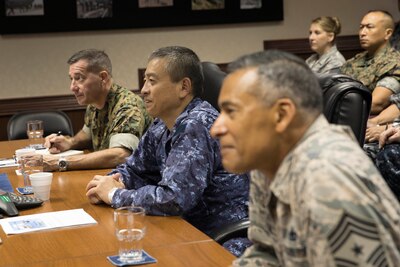WASHINGTON, Oct. 19, 2017 — North Korea's actions have
stressed the need for strong relationships with allies throughout the
Indo-Asia-Pacific region, the senior enlisted leader of U.S. Pacific Command
said here recently.
Marine Corps Sgt. Maj. Anthony A. Spadaro said success
against North Korea's nuclear program requires allies in the region to be
united in the face of the threat, and the command is working closely with
nations throughout the region to rein in Kim Jong Un.
Kim's intransigence and willingness to "fail in
public" has united the region in a way not seen in many years, the
sergeant major said. As soon as North Korea demonstrated the capability of
launching intercontinental missiles, the need for strong ties and partnerships
in the region became much more critical.
The United States will not allow a nuclear North Korea with
the means to launch the warheads, U.S. officials have said numerous times. The
United Nations placed extreme sanctions against the regime, and even China –
North Korea's lone ally – voted for the Security Council resolution. These
sanctions will take time to be effective. Meanwhile, the United States has
military options available, but diplomatic efforts continue.
Before North Korea's nuclear and missile program, it was
possible to imagine a war on the Korean Peninsula being confined to the region.
"It isn't like that now – [Kim] has the ability to strike Japan, Australia
and others," Spadaro said. "They have to defend their homelands, too.
All nations are counting on the diplomatic processes to keep rolling."
Strong Military Infrastructure
Still, the military infrastructure in the region must remain
strong, the sergeant major said. "The success in Pacific Command – or any
combatant command – is the network: that hub and spokes between partners and
allies, and the need to maintain it," he added.
Five of America's treaty allies are in the region: South
Korea, Japan, Australia, the Philippines and Thailand. Partners -- including
nations such as India, Indonesia, Sri Lanka, Vietnam and others -- also are in
the area.
Working with those allies and partners is an ongoing
process, Spadaro said, and military exercises, humanitarian efforts and
meetings all are important to that process. "It can't just be at the top
level," he said, noting that U.S. forces train with other nations' units,
partner ships maneuver with American fleets and allied aircraft work together.
Reassurance for Allies and Partners
Reassurance is a big part of the sergeant major's job now,
and he has noted that partnerships among nations in the region have become more
robust than ever. Working closely with Japan and South Korea has never been
more vital because of mutual threats we face, he said.
North Korea is not the only threat in the region. In the
Philippines, the Islamic State of Iraq and Syria and other extremist groups are
trying to establish footholds on the island of Mindanao.
"It's a tough fight against committed, violent
extremist organizations," the sergeant major said, and the Philippine
armed forces are showing successes. "It is their fight, and they are
demonstrating that they can annihilate ISIS, and that is sending a message to
the whole region," he said.
The partnerships with India, Vietnam and Sri Lanka are also
growing and evolving, the sergeant major said.
Meanwhile, China building artificial islands in the South
China Sea continues to cause concern in the area. "We will continue to
sail, fly, navigate in international waters, period," he added. "
These are areas where we are allowed to operate, and we will continue to do so.
Right now the dealings with the Chinese have been professional, and we hope it
stays that way."
Enlisted Involvement
The ties that bind the militaries in the region are
spreading to the enlisted force. During PACOM's chiefs of defense meeting in
Vancouver, British Columbia, in May, the senior enlisted leaders from the
various nations also met. The year before, there were six senior enlisted
advisors that attended, and the meeting lacked a strong focus, Spadaro said.
"This year, we had 15 [senior enlisted leaders] in the
room, and there was a lively discussion," he said. "The idea was,
'Let's export global professionalism – and not just from the U.S. perspective.'
The U.S. is not always the lead sled dog."
"The United States is a close ally of both Japan and
the Republic of Korea, and an ironclad partner with many other countries
throughout the Indo-Asia-Pacific. Those
ties rest on a foundation of shared interests and values. The individual partnerships are not just for
the benefit of both countries – but for the entire region," the sergeant
major said.
It’s a two-way street, and leaders have to realize that the
United States benefits from these alliances just as much as our international
friends, he said. "Indonesians,
Indians, Thais bring a world of military experience to a relationship with the
U.S. We need to listen to them."

No comments:
Post a Comment